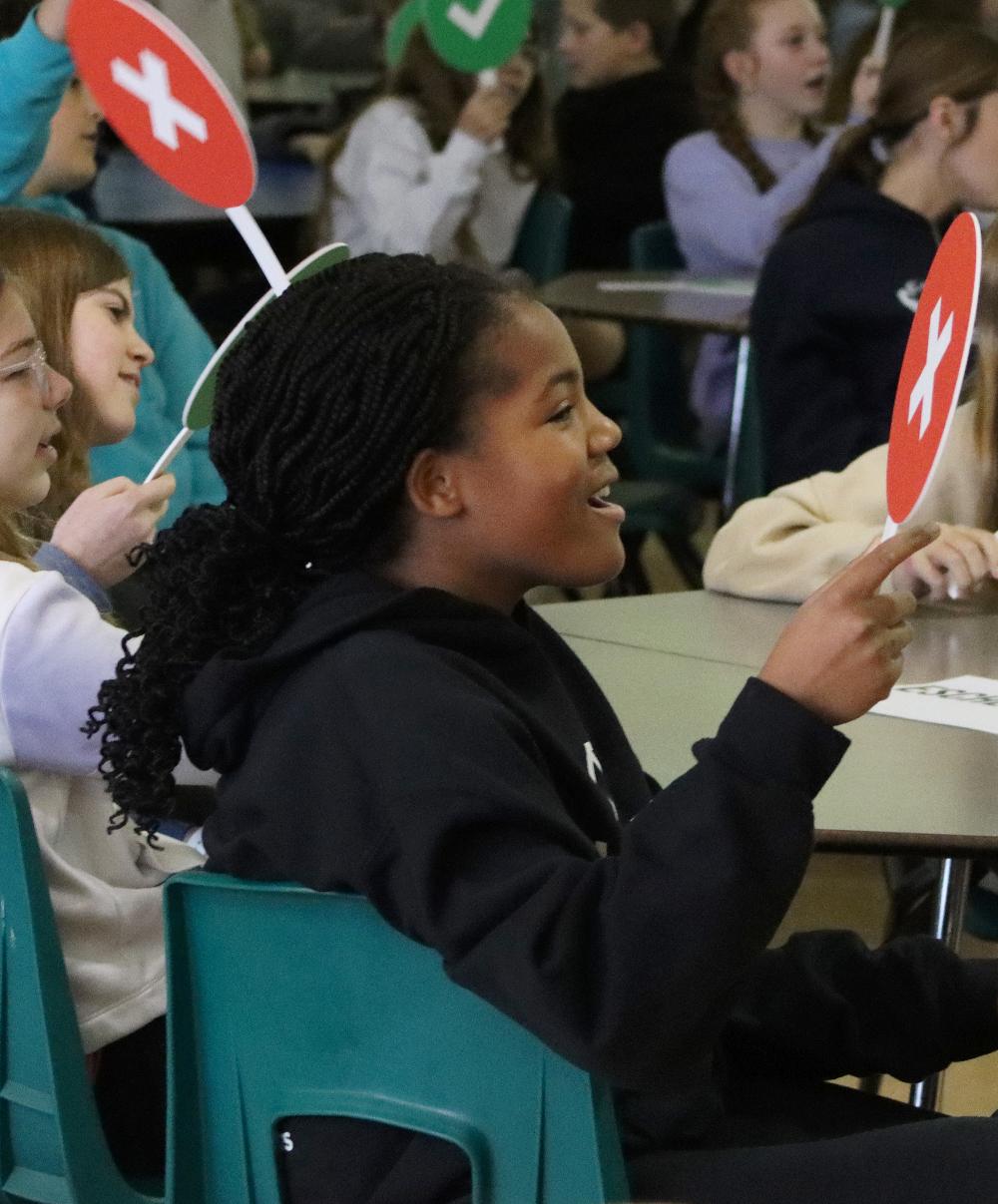Safe Surfers: Scott students gain internet safety tips from Google presentation
December 19, 2024
Scott Middle School students Willow and Mila left the multipurpose room knowing how to be strong, alert, smart, brave and kind on the internet.
The two sixth graders joined more than 250 of their classmates at Google’s “Be Internet Awesome Road Show” Dec. 17. The global company hosted a 45-minute interactive program in partnership with Omaha-based nonprofit Smart Gen Society. The goal was to teach students how to safely navigate the internet every time they pick up a smartphone, access a tablet or log onto a computer.
Mila and Willow said they collected many digital-savvy tips from the presentation.
“I think the biggest takeaway I got was our actions matter on the internet, even if we don’t think that we do, because we leave a digital footprint wherever we go, and it’s really important that we are respectful when we’re on the internet, so later on it doesn’t affect our everyday life,” Mila said.
“It was fun but it was informative,” Willow said. “It’s going to make a good impact on us, and we’re taking that into perspective. Sometimes you don’t think about those things, but this made us think.”
Smart Gen Society Chief Executive Officer Amie Konwinski said she was pleased with the morning’s outcome. Konwinski had heard great things about Scott students from her daughter, Macy, who teaches family and consumer sciences classes at the school. Google representatives shared Konwinski’s vision of reaching a large audience of middle schoolers, and they decided to bring the road show to Scott’s campus.
“We just love the opportunity to come into Lincoln Public Schools,” Konwinski said. “They are such a fantastic organization to work with, and obviously the kids did a great job and they had a great time, so it was an easy choice.”
Nebraska First Lady Suzanne Pillen spoke to students at the start of the assembly, and she later participated in a game show activity on stage. She felt the program’s interactive style helped sixth graders fully absorb the educational material.
“I think that really encourages the kids to get involved, and it’s how they learn the best,” Pillen said. “There was a lot of enthusiasm in this room today. It was exciting.”
The program’s framework focused on five tips for students to remember in today’s digital world: share content with care, don’t fall for fake, secure your information, use your power for good and when in doubt, talk it out. The audience raised paddles that contained a green check mark and red ‘x’ to answer questions throughout the morning, and multiple students told organizers why they thought internet safety was a key issue.
Konwinski said providing proactive digital education to sixth graders will make a difference both now and in the future.
“It is so important for kids to know how to be safe online, especially now,” Konwinski said. “Fifty percent of our students in the United States are spending a 40-hour work week on their phone, so we need to make sure that what they’re doing and seeing online is not only safer, but they know who to talk to when they’re going to have an issue or problem.”
Scott students Millie and Eric said they recognized the reasons why Google has launched the road show. Eric has a smartphone and uses it to watch social apps like YouTube. Millie has also become familiar with digital technology after taking computer science classes at LPS.
“I liked it because there are a lot of people who don’t know how to stay safe on the internet,” Millie said. “I thought it helped some people figure out how to be safe.”
“I probably will be more careful of who I’m talking to and why I’m talking to them, and see if they’re being suspicious or not, so I know if they’re scamming,” Eric said.
Eric said the digital literacy curriculum at LPS gave him a good foundation for Google’s program. LPS provides digital citizenship lessons to everyone in grades K-12, and LPS Library Services releases digital literacy tips on social media every Tuesday.
“That really helped with this presentation,” Eric said.
The event was the latest community outreach initiative by Google, which is building a large data center in Lincoln. The company donated $100,000 to the Foundation for Lincoln Public Schools last month. The foundation will use the money for its summer camp program called Spark. Students in first through sixth grades explore science, technology, engineering, arts and math topics in the nine-week Spark camp.
Pillen and Konwinski both said they would enjoy sharing Google-based digital literacy lessons at other schools across the state. They said watching students like Willow, Mila, Millie and Eric have fun at Scott made all of the preparation worthwhile.
“I thought it was amazing,” Konwinski said. “Google did such a great job of making sure the students felt engaged and they got all of the tips they needed to.”
To learn more about the LPS digital citizenship curriculum, visit our website at lms.lps.libguides.com/LPSdigitalcitizenship. You can also check out our other digital literacy resources for students and families at home.lps.org/technology/keyconcepts.
Do you have a story idea? Share it with the LPS Communications Team by filling out this form!
Published: December 19, 2024, Updated: December 19, 2024
Scott Middle School sixth grader Willow smiles as she participates in an interactive presentation from Google on Dec. 17. Experts from Google taught students how to be strong, alert, smart, brave and kind on the internet. Nebraska First Lady Suzanne Pillen spoke to the audience at the beginning of the event and also took part in a game show activity.

